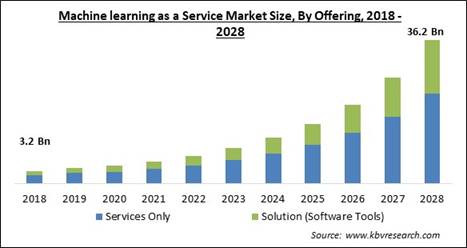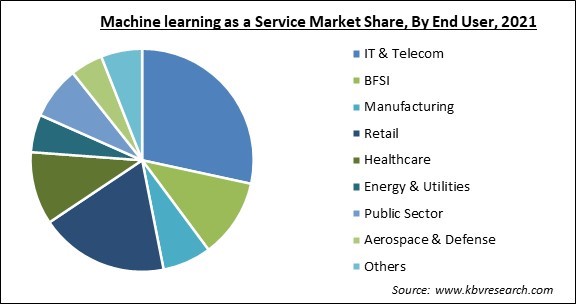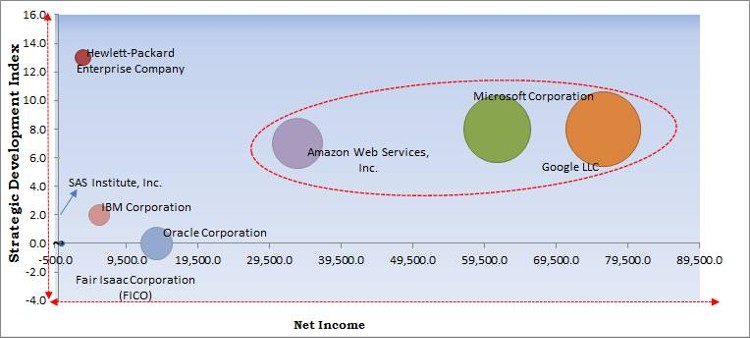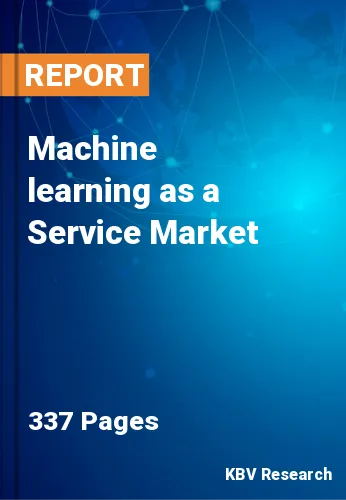The Global Machine learning as a Service Market size is expected to reach $36.2 billion by 2028, rising at a market growth of 31.6% CAGR during the forecast period.
Machine learning is a data analysis method that includes statistical data analysis to create desired prediction output without the use of explicit programming. It uses a sequence of algorithms to comprehend the link between datasets in order to produce the desired result. It is designed to include artificial intelligence (AI) and cognitive computing functionalities. Machine learning as a service (MLaaS) refers to a group of cloud computing services that provide machine learning technologies.
Increased demand for cloud computing, as well as growth connected with artificial intelligence and cognitive computing, are major machine learning as service industry growth drivers. Growth in demand for cloud-based solutions, such as cloud computing, rise in adoption of analytical solutions, growth of the artificial intelligence & cognitive computing market, increased application areas, and a scarcity of trained professionals are all influencing the machine learning as a service market.
As more businesses migrate their data from on-premise storage to cloud storage, the necessity for efficient data organization grows. Since MLaaS platforms are essentially cloud providers, they enable solutions to appropriately manage data for machine learning experiments and data pipelines, making it easier for data engineers to access and process the data.
For organizations, MLaaS providers offer capabilities like data visualization and predictive analytics. They also provide APIs for sentiment analysis, facial recognition, creditworthiness evaluations, corporate intelligence, and healthcare, among other things. The actual computations of these processes are abstracted by MLaaS providers, so data scientists don't have to worry about them. For machine learning experimentation and model construction, some MLaaS providers even feature a drag-and-drop interface.

The COVID-19 pandemic has had a substantial impact on numerous countries' health, economic, and social systems. It has resulted in millions of fatalities across the globe and has left the economic and financial systems in tatters. Individuals can benefit from knowledge about individual-level susceptibility variables in order to better understand and cope with their psychological, emotional, and social well-being.
Artificial intelligence technology is likely to aid in the fight against the COVID-19 pandemic. COVID-19 cases are being tracked and traced in several countries utilizing population monitoring approaches enabled by machine learning and artificial intelligence. Researchers in South Korea, for example, track coronavirus cases using surveillance camera footage and geo-location data.
The industry is growing due to the increased acceptance of cloud computing technologies and the use of social media platforms. Cloud computing is now widely used by all companies that supply enterprise storage solutions. Data analysis is performed online using cloud storage, giving the advantage of evaluating real-time data collected on the cloud. Cloud computing enables data analysis from any location and at any time. Moreover, using the cloud to deploy machine learning allows businesses to get useful data, such as consumer behavior and purchasing trends, virtually from linked data warehouses, lowering infrastructure and storage costs. As a result, the machine learning as a service business is growing as cloud computing technology becomes more widely adopted.
Machine learning is used to fuel reasoning, learning, and self-correction in artificial intelligence (AI) systems. Expert systems, speech recognition, and machine vision are examples of AI applications. The rise in the popularity of AI is due to current efforts such as big data infrastructure and cloud computing. Top companies across industries, including Google, Microsoft, and Amazon (Software & IT); Bloomberg, American Express (Financial Services); and Tesla and Ford (Automotive), have identified AI and cognitive computing as a key strategic driver and have begun investing in machine learning to develop more advanced systems. These top firms have also provided financial support to young start-ups in order to produce new creative technology.
The ML platform provides a plethora of advantages that aid in market expansion. However, several parameters on the platform are projected to impede market expansion. The presence of inaccuracy in these algorithms, which are sometimes immature and underdeveloped, is one of the market's primary constraining factors. In the big data and machine learning manufacturing industries, precision is crucial. A minor flaw in the algorithm could result in incorrect items being produced. This would exorbitantly increase the operational costs for the owner of the manufacturing unit than decrease it.

Based on End User, the market is segmented into IT & Telecom, BFSI, Manufacturing, Retail, Healthcare, Energy & Utilities, Public Sector, Aerospace & Defense, and Others. The retail segment garnered a substantial revenue share in the machine learning as a service market in 2021. E-commerce has proven to be a key force in the retail trade industry. Machine intelligence is used by retailers to collect data, evaluate it, and use it to provide customers with individualized shopping experiences. These are some of the factors that influence the retail industries' demand for this technology.
Based on Offering, the market is segmented into Services Only and Solution (Software Tools). The services only segment acquired the largest revenue share in the machine learning as a service market in 2021. The market for machine learning services is expected to grow due to factors such as an increase in application areas and growth connected with end-use industries in developing economies. To enhance the usage of machine learning services, industry participants are focusing on implementing technologically advanced solutions. The use of machine learning services in the healthcare business for cancer detection, as well as checking ECG and MRI, is expanding the market. Machine learning services' benefits, such as cost reduction, demand forecasting, real-time data analysis, and increased cloud use, are projected to open up considerable prospects for the market.
Based on Organization Size, the market is segmented into Large Enterprises and Small & Medium Enterprises. The small and medium enterprises segment procured a substantial revenue share in the machine learning as a service market in 2021. This is because implementation of machine learning lets SMEs optimize its processes on a tight budget. AI and machine learning are projected to be the major technologies that allow SMEs to save money on ICT and gain access to digital resources in the near future.
Based on Application, the market is segmented into Marketing & Advertising, Fraud Detection & Risk Management, Computer vision, Security & Surveillance, Predictive analytics, Natural Language Processing, Augmented & Virtual Reality, and Others. The marketing and advertising segment acquired the largest revenue share in the machine learning as a service market in 2021. The goal of a recommendation system is to provide customers with products that they are currently interested in. The following is the marketing work algorithm: Hypotheses are developed, tested, evaluated, and analyzed by marketers. Because information changes every second, this effort is time-consuming and labor-intensive, and the findings are occasionally wrong. Machine learning allows marketers to make quick decisions based on large amounts of data. Machine learning allows businesses to respond more quickly to changes in the quality of traffic generated by advertising efforts. As a result, the business can spend more time developing hypotheses rather than doing mundane tasks.
| Report Attribute | Details |
|---|---|
| Market size value in 2021 | USD 5.5 Billion |
| Market size forecast in 2028 | USD 36.2 Billion |
| Base Year | 2021 |
| Historical Period | 2018 to 2020 |
| Forecast Period | 2022 to 2028 |
| Revenue Growth Rate | CAGR of 31.6% from 2022 to 2028 |
| Number of Pages | 337 |
| Number of Tables | 533 |
| Report coverage | Market Trends, Revenue Estimation and Forecast, Segmentation Analysis, Regional and Country Breakdown, Competitive Landscape, Companies Strategic Developments, Company Profiling |
| Segments covered | Offering, Application, Organization Size, End User, Region |
| Country scope | US, Canada, Mexico, Germany, UK, France, Russia, Spain, Italy, China, Japan, India, South Korea, Singapore, Malaysia, Brazil, Argentina, UAE, Saudi Arabia, South Africa, Nigeria |
| Growth Drivers |
|
| Restraints |
|
Based on Regions, the market is segmented into North America, Europe, Asia Pacific, and Latin America, Middle East & Africa. The Asia Pacific region garnered a significant revenue share in the machine learning as a service market in 2021. Leading companies are concentrating their efforts in Asia-Pacific to expand their operations, as the region is likely to see rapid development in the deployment of security services, particularly in the banking, financial services, and insurance (BFSI) sector. To provide better customer service, industry participants are realizing the significance of providing multi-modal platforms. The rise in AI application adoption is likely to be the primary trend driving market growth in this area. Furthermore, government organizations have taken important steps to accelerate the adoption of machine learning and related technologies in this region.
Free Valuable Insights: Global Machine learning as a Service Market size to reach USD 36.2 Billion by 2028

The major strategies followed by the market participants are Product Launches and Partnerships. Based on the Analysis presented in the Cardinal matrix; Amazon Web Services, Inc., Microsoft Corporation, and Google LLC are the forerunners in the Machine learning as a Service Market. Companies such SAS Institute, Inc., IBM Corporation are some of the key innovators in the Market.
The market research report covers the analysis of key stake holders of the market. Key companies profiled in the report include Hewlett-Packard Enterprise Company, Oracle Corporation, Google LLC, Amazon Web Services, Inc. (Amazon.com, Inc.), IBM Corporation, Microsoft Corporation, Fair Isaac Corporation (FICO), SAS Institute, Inc., Yottamine Analytics, LLC, and BigML.
Jun-2021: Hewlett Packard completed the acquisition of Determined AI, a San Francisco-based startup that offers a strong and solid software stack to train AI models faster, at any scale, utilizing its open-source machine learning (ML) platform. Hewlett Packard integrated Determined AI’s unique software solution with its world-leading AI and high-performance computing (HPC) products to empower ML engineers to conveniently deploy and train machine learning models to offer faster and more precise analysis from their data in almost every industry.
By End User
By Offering
By Organization Size
By Application
By Geography
The global machine learning as a service market size is expected to reach $36.2 billion by 2028.
Increased demand for cloud computing and a boom in big data are increasing are driving the market in coming years, however, technical glitches and complete reliance on connectivity and power growth of the market.
Hewlett-Packard Enterprise Company, Oracle Corporation, Google LLC, Amazon Web Services, Inc. (Amazon.com, Inc.), IBM Corporation, Microsoft Corporation, Fair Isaac Corporation (FICO), SAS Institute, Inc., Yottamine Analytics, LLC, and BigML.
The IT & Telecom segment acquired maximum revenue share in the Global Machine learning as a Service Market by End User in 2021, thereby, achieving a market value of $9.2 billion by 2028.
The Large Enterprises segment is leading the Global Machine learning as a Service Market by Organization Size in 2021, thereby, achieving a market value of $25.1 billion by 2028.
The North America market dominated the Global Machine learning as a Service Market by Region in 2021, and would continue to be a dominant market till 2028.
Our team of dedicated experts can provide you with attractive expansion opportunities for your business.

